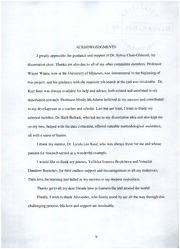
Internet adoption in post-communist countries : a proposed model for the study of internet diffusion PDF
Preview Internet adoption in post-communist countries : a proposed model for the study of internet diffusion
INTERNETADOPTIONINPOST-COMMUNISTCOUNTRIES: APROPOSEDMODELFORTHESTUDYOFINTERNETDIFFUSION By DAN1ELAV.DIMITROVA ADISSERTATIONPRESENTEDTOTHEGRADUATESCHOOL OFTHEUNIVERSITYOFFLORIDAINPARTIALFULFILLMENT OFTHEREQUIREMENTSFORTHEDEGREEOF DOCTOROFPHILOSOPHY UNrvERsnrofFlorida 2003 ACKNOWLEDGMENTS IgreatlyappreciatetheguidanceandsupportofDr.SylviaChan-Olmsted,my dissertationchair.Thanksarealsoduetoallofmyothercommitteemembers.Professor WayneWanta,nowattheUniversityofMissouri,wasinstrumentaltothebeginningof thisproject,andhisguidancewiththerequisitejobsearchattheendwasinvaluable. Dr. KurtKentwasalwaysavailableforhelpandadvice,bothrelatedandunrelatedtomy dissertationresearch.ProfessorMindyMcAdamsbelievedinmysuccessandcontributed tomydevelopmentasateacherandscholar.Lastbutnotleast,Iwanttothankmy externalmember,Dr.RichBeilock,wholedmetomydissertationideaandalsokeptme onmytoes,helpedwiththedatacollection,offeredvaluablemethodologicalassistance, allwithasenseofhumor. Ithankmymentor,Dr.LyndaLeeKaid,whowasalwaysthereformeandwhose passionforresearchservedasawonderfulexample. Iwouldliketothankmyparents,VelitckaIvanovaBoytchevaandVesselin DimitrovBoytchev,fortheirendlesssupportandencouragementinallmyendeavors. Theirloveforlearningandbeliefinmysuccessismydeepestinspiration. ThanksgotoallmydearfriendshereinGainesvilleandaroundtheworld. Finally,IwishtothankAlexander,whofirmlystoodbymeallthewaythroughthis challengingprocess.Hisloveandsupportareinvaluable. 11 TABLEOFCONTENTS Page ACKNOWLEDGMENTS ii LISTOFTABLES vi LISTOFFIGURES vii ABSTRACT viii 1INTRODUCTION 1 InternetSignificance 1 EconomicContributions 2 PoliticalContributions 3 TechnologicalContributions 4 SocialContributions 5 OtherContributions 6 Post-communistCountries 7 TransitionProgress 7 GeographicRegions 9 EconomicInequalities 9 NeedforResearchofInternetDiffusion 10 ResearchMethod 16 DissertationOutline 17 2INTERNETANDSOCIETY 18 DevelopmentoftheInternet 18 TheInventionoftheInternet 18 InternetGrowthandGlobalExpansion 21 InternetandPoliticalDevelopment 25 DemocracyandtheInternet 26 FreePressandtheInternet 29 InternetandEconomicDevelopment 31 LowerProductionandDistributionCosts 32 TheInternetEconomy 33 GlobalMarkets 34 Leapfrogging 35 in 3LITERATUREREVIEW 37 DiffusionofInnovations 37 BasicGeneralizations 38 TechnologyInnovationAttributes 39 ClusterInnovations 42 TypesofAdopters 43 OtherCommunicationTechnologies 46 LevelsofInternetAdoption 48 OtherConsiderationsforInternetAdoption 49 NewMediaTechnologiesResearch 50 EconomicFactors 51 PoliticalClimateandPolicy 57 Technology/Infrastructure 66 AudienceCharacteristics 69 CulturalFactors 72 ConceptualFramework 76 FurtherThought 77 4METHODS 82 ResearchDesign 82 DataCollection 84 OperationalDefinitions 85 Economicvariable 85 Politicalclimateandpolicyvariables 86 Technology/Infrastructurevariable 88 Audiencevariables 89 Culturalvariable 90 Dependentvariable 90 TheModel 95 StatisticalProcedures 96 MultipleRegressionTechnique 96 StepwiseRegression 99 Hypotheses 100 Proposition1 100 Proposition2 100 Proposition3 101 Proposition4 101 Proposition5 102 Proposition6 102 MethodologicalNotes 102 5RESULTS 107 DescriptiveAnalysis 107 InternetUsers 107 IV 1 GrossNationalProduct 109 HO Democratization TelecommunicationsPrivatization 11 Teledensity "* Education 112 Religion 112 BivariateCorrelations 112 RegressionResults 113 StatisticalAssumptions 113 HypothesesTesting 115 FinalModel 119 TobitEstimates 124 6DISCUSSION 126 Overview 126 DiscussionofDescriptiveAnalysis 128 RegionalVariations 128 GrowthofInternetUse 130 DiscussionofHypotheses2through6 134 NationalIncome 134 Democratization 136 TelecommunicationsPrivatization 138 Infrastructure 140 Education 142 Religion 144 RefinedConceptualFramework 147 7CONCLUSION 151 Conclusions 151 Implications 153 TheoreticalImplications 153 AppliedImplications 155 Limitations 159 Validity 160 Internalvalidity 160 Externalvalidity 163 Reliability 164 SuggestionsforFutureResearch 165 LISTOFREFERENCES 169 BIOGRAPHICALSKETCH 184 LISTOFTABLES Table page 1-1. InternetHostsper10,000populationin1995and1999 15 4-1. DefinitionofvariablesintheproposedmodelofInternetdiffusion 83 4-2. Correlationmatrixforthecontinuousindependentvariables 105 5-1. Internetusersper10,000peoplein1999 109 5-2. Descriptivestatisticsofvariables 110 5-3. Pearsoncorrelationsbetweendependentandindependentvariables 113 5-4. RegressionresultsforInternetusers 116 5-5. Summaryofhypothesistesting 118 5-6. ANOVATableforCompleteModel 120 5-7. ANOVATableforModel2 121 5-8. ANOVATableforModel3 122 5-9. ANOVATableforModel4 123 5-10.Tobitestimatesforfinalmodel 125 VI LISTOFFIGURES Figure E^ge 1-1. Internethostsacrossworldregions 12 2-1. Internettimeline 21 2-2. TotalnumberofInternethosts 22 3-1. Internethostsacrossincomeregions 53 4-1. Graphicmodel 95 5-1. DistributionofInternetusersacrosscountries 114 vn AbstractofDissertationPresentedtotheGraduateSchool oftheUniversityofFloridainPartialFulfillmentofthe RequirementsfortheDegreeofDoctorofPhilosophy INTERNETADOPTIONINPOST-COMMUNISTCOUNTRIES: APROPOSEDMODELFORTHESTUDYOFINTERNETDIFFUSION By DANIELAV.DIMITROVA May2003 Chair: Dr.SylviaChan-Olmsted MajorDepartment: MassCommunication Thisdissertationproposedandtestedafive-dimensionaltheoreticalframeworkto explainthevariationsinInternetuseacrossthepost-communistcountries.The frameworkincludedeconomic,politicalclimateandpolicy,technology/infrastructure, cultural,andaudiencefactors.Threefactorsemergedascriticallyimportant:economic, political,andinfrastructurefactors.Culturalfactorsseemedtohavepartialimpact.These findingssuggestthatthetraditionalcountry-levelindicatorsofeconomicwealthand technologicalinfrastructureremainimportantdeterminantsofInternetuseinthe countriesofEasternEuropeandtheformerSovietUnion.Themostsignificant determinant,however,waslevelofdemocratization. Theresultsofthemultipleregressionanalysisreportedinthisstudyindicatethat democratization,teledensity,andGNPpercapitawerethethreemostimportantfactors positivelyrelatedtoInternetuseinthepost-communistcountries.Beingpredominantly MuslimhadanegativeeffectonInternetusewhilebeingWesternChristian(Protestantor via Catholic)seemedunrelatedtoInternetadoption.Neitherlengthoftelecommunications privatizationnoreducationlevelappearedsignificantinthisanalysis. Thus,theresultsofthisstudyshedlightonthemacro-levelindicatorsthataffect Internetadoptioninthepost-communistcountries.Thesehaveimportantimplicationsfor policymakersatthelocal,national,andinternationallevel.TheproposedInternet diffusionmodelmaybeapplicabletootherregions,butthisanalysisfocusedonlyonthe 28post-communistcountries. ix CHAPTER1 INTRODUCTION Humanhistoryhaswitnessedtheriseandfallofmanynewtechnologies.The Internetisoftendescribedasthemostrevolutionarynewtechnologyeveranditsgrowth ineverycountryaroundtheglobeisremarkableaswellasirreversible.TheInternetisnot justatechnologicalinnovation;itisaunique,fascinating,multifacetednetworkthat transcendsnationalboundaries.Itaffectspeople,communities,organizations,and countriesaroundtheworld.Inthisdissertation,Internetadoptionisexaminedinaunique regionoftheworld-thepost-communistcountries.1Thedissertationproposesafive- dimensionalanalyticalframeworktoaccountfordifferencesinInternetdiffusioninthose countries.Testingthefive-dimensionalframeworkidentifiesthemaindeterminantsof InternetadoptionandillustrateshowthesedeterminantsaffectInternetuseinthepost- communistcountries. InternetSignificance TheInternetconstitutes"atonceaworld-widebroadcastingcapability,a mechanismforinformationdissemination,andamediumforcollaborationand interactionbetweenindividualsandtheircomputerswithoutregardforgeographical location"(Leineretal.,1997).TheInternethasaffectedsocietyinavarietyofwaysasa 1Thepost-communistcountriesaredefinedasthecountriesofEasternEurope,the formerSovietUnion,andMongolia.Specifically,thestudyexaminesAlbania,Armenia, Azerbaijan,Belarus,BosniaandHerzegovina,Bulgaria,Croatia,CzechRepublic, Estonia,Georgia,Hungary,Kazakhstan,Kyrgyzstan,Latvia,Lithuania,Macedonia (FYROM),Moldova,Mongolia,Poland,Romania,Russia,SlovakRepublic,Slovenia, Tajikistan,Turkmenistan,Ukraine,Uzbekistan,andYugoslavia(Serbiaand Montenegro).
